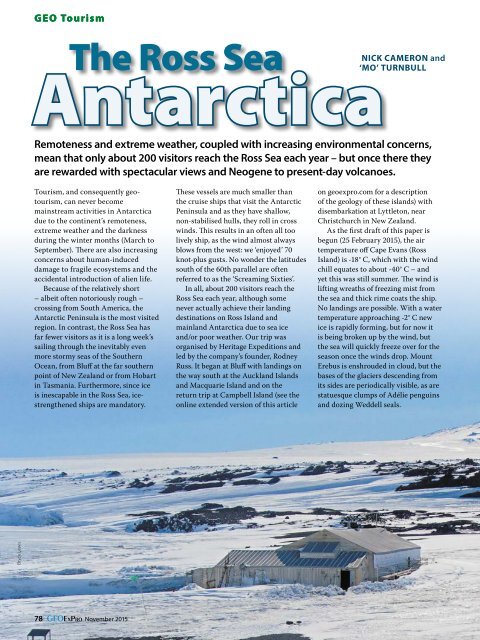Iraqi Kurdistan All in the Timing
GEO_ExPro_v12i6
GEO_ExPro_v12i6
You also want an ePaper? Increase the reach of your titles
YUMPU automatically turns print PDFs into web optimized ePapers that Google loves.
GEO Tourism<br />
The Ross Sea<br />
NICK CAMERON and<br />
‘MO’ TURNBULL<br />
Antarctica<br />
Remoteness and extreme wea<strong>the</strong>r, coupled with <strong>in</strong>creas<strong>in</strong>g environmental concerns,<br />
mean that only about 200 visitors reach <strong>the</strong> Ross Sea each year – but once <strong>the</strong>re <strong>the</strong>y<br />
are rewarded with spectacular views and Neogene to present-day volcanoes.<br />
Tourism, and consequently geotourism,<br />
can never become<br />
ma<strong>in</strong>stream activities <strong>in</strong> Antarctica<br />
due to <strong>the</strong> cont<strong>in</strong>ent’s remote ness,<br />
extreme wea<strong>the</strong>r and <strong>the</strong> dark ness<br />
dur<strong>in</strong>g <strong>the</strong> w<strong>in</strong>ter months (March to<br />
September). There are also <strong>in</strong> creas<strong>in</strong>g<br />
concerns about human-<strong>in</strong>duced<br />
damage to fragile ecosystems and <strong>the</strong><br />
accidental <strong>in</strong>troduction of alien life.<br />
Because of <strong>the</strong> relatively short<br />
– albeit often notoriously rough –<br />
cross<strong>in</strong>g from South America, <strong>the</strong><br />
Antarctic Pen<strong>in</strong>sula is <strong>the</strong> most visited<br />
region. In contrast, <strong>the</strong> Ross Sea has<br />
far fewer visitors as it is a long week’s<br />
sail<strong>in</strong>g through <strong>the</strong> <strong>in</strong>evitably even<br />
more stormy seas of <strong>the</strong> Sou<strong>the</strong>rn<br />
Ocean, from Bluff at <strong>the</strong> far sou<strong>the</strong>rn<br />
po<strong>in</strong>t of New Zealand or from Hobart<br />
<strong>in</strong> Tasmania. Fur<strong>the</strong>rmore, s<strong>in</strong>ce ice<br />
is <strong>in</strong>escapable <strong>in</strong> <strong>the</strong> Ross Sea, icestreng<strong>the</strong>ned<br />
ships are mandatory.<br />
These vessels are much smaller than<br />
<strong>the</strong> cruise ships that visit <strong>the</strong> Antarctic<br />
Pen<strong>in</strong>sula and as <strong>the</strong>y have shallow,<br />
non-stabilised hulls, <strong>the</strong>y roll <strong>in</strong> cross<br />
w<strong>in</strong>ds. This results <strong>in</strong> an often all too<br />
lively ship, as <strong>the</strong> w<strong>in</strong>d almost always<br />
blows from <strong>the</strong> west: we ‘enjoyed’ 70<br />
knot-plus gusts. No wonder <strong>the</strong> latitudes<br />
south of <strong>the</strong> 60th parallel are often<br />
referred to as <strong>the</strong> ‘Scream<strong>in</strong>g Sixties’.<br />
In all, about 200 visitors reach <strong>the</strong><br />
Ross Sea each year, although some<br />
never actually achieve <strong>the</strong>ir land<strong>in</strong>g<br />
dest<strong>in</strong>ations on Ross Island and<br />
ma<strong>in</strong>land Antarctica due to sea ice<br />
and/or poor wea<strong>the</strong>r. Our trip was<br />
organised by Heritage Expeditions and<br />
led by <strong>the</strong> company’s founder, Rodney<br />
Russ. It began at Bluff with land<strong>in</strong>gs on<br />
<strong>the</strong> way south at <strong>the</strong> Auckland Islands<br />
and Macquarie Island and on <strong>the</strong><br />
return trip at Campbell Island (see <strong>the</strong><br />
onl<strong>in</strong>e extended version of this article<br />
on geoexpro.com for a description<br />
of <strong>the</strong> geology of <strong>the</strong>se islands) with<br />
disembarkation at Lyttleton, near<br />
Christchurch <strong>in</strong> New Zealand.<br />
As <strong>the</strong> first draft of this paper is<br />
begun (25 February 2015), <strong>the</strong> air<br />
temperature off Cape Evans (Ross<br />
Island) is -18° C, which with <strong>the</strong> w<strong>in</strong>d<br />
chill equates to about -40° C – and<br />
yet this was still summer. The w<strong>in</strong>d is<br />
lift<strong>in</strong>g wreaths of freez<strong>in</strong>g mist from<br />
<strong>the</strong> sea and thick rime coats <strong>the</strong> ship.<br />
No land<strong>in</strong>gs are possible. With a water<br />
temperature approach<strong>in</strong>g -2° C new<br />
ice is rapidly form<strong>in</strong>g, but for now it<br />
is be<strong>in</strong>g broken up by <strong>the</strong> w<strong>in</strong>d, but<br />
<strong>the</strong> sea will quickly freeze over for <strong>the</strong><br />
season once <strong>the</strong> w<strong>in</strong>ds drop. Mount<br />
Erebus is enshrouded <strong>in</strong> cloud, but <strong>the</strong><br />
bases of <strong>the</strong> glaciers descend<strong>in</strong>g from<br />
its sides are periodically visible, as are<br />
statuesque clumps of Adélie pengu<strong>in</strong>s<br />
and doz<strong>in</strong>g Weddell seals.<br />
Bryce Lewis<br />
78 GEOExPro November 2015


